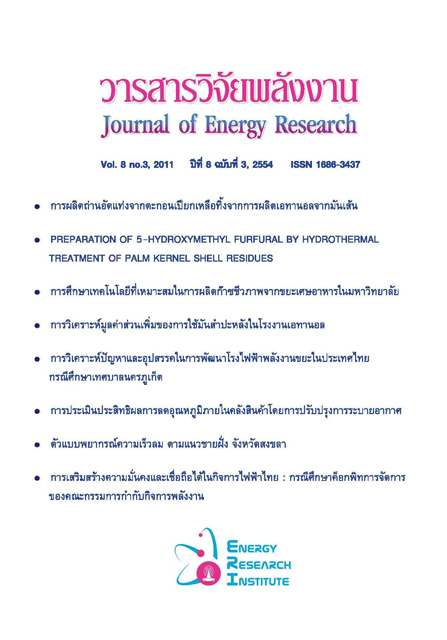การวิเคราะห์มูลค่าส่วนเพิ่มของการใช้มันสำปะหลังในโรงงานเอทานอล
Main Article Content
Abstract
งานวิจัยนี้มีวัตถุประสงค์เพื่อประเมินคุณค่าของมันสำปะหลังที่นำไปใช้ในการผลิตเอทานอลโดยการวิเคราะห์ทางการเงินเพื่อเปรียบเทียบหาความคุ้มค่าในการลงทุนและคิดมูลค่าย้อนกลับเพื่อหามูลค่าส่วนเพิ่มของมันสำปะหลัง ในการศึกษานี้แบ่งโรงงานเอทานอลออกเป็น 3 รูปแบบ คือ 1) เป็นกรณีที่ยังไม่ได้นำผลพลอยได้จากกระบวนการผลิตเอทานอลไปใช้ประโยชน์ในการผลิตพลังงานทดแทน เช่น น้ำกากส่าและเปลือกมันสำปะหลังสดนำไปเป็นอาหารสัตว์ เป็นต้น 2) เป็นกรณีที่มีการนำผลพลอยได้จากกระบวนการผลิตเอทานอลไปผลิตก๊าซชีวภาพ เพื่อทดแทนน้ำมันเตา เป็นต้น และ 3) เป็นกรณีที่นำผลพลอยได้จากกระบวนการผลิตเอทานอลไปผลิตไฟฟ้า เพื่อจำหน่ายไฟฟ้าให้กับการไฟฟ้าส่วนภูมิภาค และนำมาวิเคราะห์ผลตอบแทนการลงทุน การวิเคราะห์ความอ่อนไหว และมูลค่าเพิ่มของมันสำปะหลัง เพื่อคิดหามูลค่าย้อนกลับของมันสำปะหลัง จากการวิเคราะห์พบว่า กรณีที่ 2 ให้ผลตอบแทนสูงกว่ากรณีอื่นๆ นอกจากนี้ผลจากการวิเคราะห์ความยืดหยุ่นของราคามันสำปะหลังเทียบกับค่าไฟฟ้า ราคาน้ำมันเตา ราคาเอทานอล และผลตอบแทนการลงทุน(IRR) ได้พบว่ากรณีที่ 2 มีความยืดหยุ่นต่ำสุด ซึ่งแสดงให้เห็นว่าราคามันสำปะหลังมีผลทำให้ผลตอบแทนทางการเงิน ต้นทุนค่าไฟฟ้า และต้นทุนค่าน้ำมันเตา เปลี่ยนแปลงไปในทิศทางตรงกันข้าม แต่ราคาขายเอทานอลเปลี่ยนแปลงไปในทิศทางเดียวกัน
Value Added Analysis for Ethanol Plant using Cassava
This study aims to evaluate the value of cassava which is used for production based. Financial analysis is used to compare the cost of investment and Net Back Value to determine value added to cassava. Study consist of 3 cases of ethanol plants, Firstly, byproduct from ethanol production process; such as distillery slop and fresh cassava peel, is not used as renewable energy resources, however, it is used as animal feed. Second, a byproduct of ethanol production process is being used to produce biogas to replace fuel oil. Finally, the byproduct is used to generate electricity for PEA. Finally, this study will analyze the return on investment, sensitivity analysis and the value added to cassava in order to figure out the Net Back Value. The study shows that case number 2 yields the highest return (less elastic) than another two cases. The price of cassava tends to change negatively towards the cost of investments, prices of electricity and fuel oil. Thus the price of ethanol has a positive effect towards the price of cassava.

